“The same sufferings are experienced by your brotherhood in the world” (1 Peter 5).
Showing posts with label India. Show all posts
Showing posts with label India. Show all posts
Thursday, April 4, 2013
Police prevent believers from stopping the destruction of their church
India (MNN) ― In the "Hindu Heartland" of India, another church falls victim to anti-Christian attacks.
A group of villagers in Chhattisgarh recently destroyed a 300-person church.
"It took about an hour for a year's worth of labor to be just completely undone." says Lindsay Ackerman of Grand Rapids, Michigan-based Mission India.
Ackerman says the church was planted by one of Mission India's church-planting partners in India. Christ-followers had scrimped and saved all year for a new church building, and in February their dream came true.
"The church members had worked for over a year to secure the legal documents they needed to build their first small church," says Ackerman.
Soon, someone donated a piece of land, legal paperwork was completed, and construction began on the new church. Its doors opened two months ago, and believers had their first worship service in the new building.
"Suddenly with no warning, a group of 100 people from the nearby village showed up and demolished the church," Ackerman explains. Believers were helpless as their church fell to the ground.
"Police were actually present and were pushing believers away who were trying to stop attackers from tearing down their brand new church."
There seem to be many indications the Good News was involved.
"The Gospel had been spreading, and I'm sure that was a factor behind the attack," states Ackerman. "When people start to see that many people coming to Christ--the response to the Gospel, they want to do anything they can to stop it."
It's a difficult time in Chhattisgarh.
"This church was built with a lot of joy and hope," says Ackerman. "Right now, all that exists is just a heap of rubble, and they are discouraged."
However, believers are still holding worship services. In fact, they're worshipping God right next to the demolished structure.
Pray "that they would have a sense of Christ's presence in their midst, understanding that a building is not what their faith is all about."
Click here to read the latest updates and see how the Gospel is changing lives.
Labels:
chhattisgarh,
church destruction,
hindu heartland,
India,
lindsay ackerman,
mission india,
persecution
Location:
India
Thursday, March 21, 2013
Church leaders gather to form strategies, partnerships
Nepal (MNN) ― Leaders from India, Pakistan and Nepal met last week to talk strategy.
 |
| David Shibley |
"We believe that something very important was begun through this summit, and we want to...continue it for the glory of God," says David Shibley of Global Advance.
A total of 30 church leaders from Pakistan, India and Nepal gathered in Kathmandu, Nepal for the Tri-Nations Summit -- possibly the first event of its kind. They met to pray together, reaffirm their commitment to spread the Good News in their nation and encourage one another in the face of persecution.
Though their backgrounds are different, each leader at the summit shared a common concern - how to share the Gospel in a nation hostile to Christianity.
"In each one of their contexts, [leaders] are continuing to proclaim the Gospel, and they are seeing people come to faith in the Lord Jesus Christ," Shibley says.
"They committed to follow the leading of God's Spirit in forging new partnerships for the advance of the Gospel."
See all the commitments made at the Tri-Nations Summit here.
Global Advance is coming alongside church leaders with vital resources. Pray these materials would reach people who need them.
Along with pairing up to help the Gospel go further in South Asia, believers lived out Paul's charge in Romans 12:15 to 'weep with those who weep'. Muslim violence in Lahore, Pakistan occurred while Pakistani delegates were at the Tri-Nations Summit.
"It was a very moving sight to see Nepali pastors and pastors from India come and gather round those wonderful leaders from Pakistan and pray for them and weep with them," shares Shibley.
As the Summit concluded, delegates agreed to pray and fast on the third day of each month. They'll be praying for one another and for the three nations that were the focus of the Summit.
Ask God to protect the unity and partnerships formed between church leaders in Pakistan, India and Nepal. Pray church leaders would know "They're not forgotten, that they're not alone, and that the Body of Christ around the world is standing with them and praying for them."
Tuesday, March 19, 2013
GFA-supported church leader released from wrongful imprisonment
 |
| Believers honored Pastor Samuel with flowers following his release. (Image courtesy of GFA) |
India (GFA/MNN) ― After spending 8 years in prison under false charges, a pastor supported by Gospel for Asia (GFA) is finally free.
Jharkhand, India, is home to thousands of insurgent Maoists fighting for communist control. After a vicious fight that left 19 policemen dead, authorities were on the lookout for rebels behind the attacks. Thinking they found one in 2004, the supposed insurgent was arrested and put in prison.
But the man authorities arrested wasn't a rebel: he was a GFA-supported missionary named Samuel. Though believers did everything they could to get Samuel released, days dragged into years.
Fast-forward to 2010: Pastor Samuel was officially cleared of all charges. But national strikes and more delayed court hearings kept him behind bars. He was unable to return to his wife and 8-year old daughter.
"I was totally depressed in this situation, but the Lord helped me to realize He has a special plan for me to be in the prison," Samuel wrote.
"The Lord is helping me to share the love of Jesus with the prisoners. Through my ministry, I see the transformation that is happening in the lives of the prisoners."
Instead of sulking, Samuel kept sharing the Gospel with fellow prisoners. He soon gained the trust and appreciation of jail authorities. Through Pastor Samuel's influence, many inmates found new hope in Christ.
Pray that these new believers would grow in their relationship with Christ.
GFA trains, equips, and sends out national missionaries throughout Asia to reach their people for Christ. You can learn more about their program and sponsor a national missionary here. Now that he's free, Pastor Samuel intends to keep sharing the Good News.
"Many of our missionaries face extremely difficult and unexpected circumstances," says GFA President K.P. Yohannan. "But they know these are normal challenges for servants of God working in such unreached areas where the powers of darkness are so strong.
"These missionaries are willing to face these unexplainable circumstances and continue on. And God is blessing their sacrifice."
Pray for national missionaries facing persecution in India. Ask God to comfort and strengthen them and their families.
Labels:
GFA,
gospel,
Gospel for Asia,
India,
pastor samuel,
persecution,
prison ministry
Location:
India
Thursday, December 20, 2012
Organized violence not enough to stop Gospel work
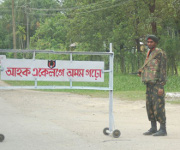 |
| Police join Hindu extremists in persecuting Christians. (Image courtesy of Mission India) |
India (MNN) ― It's not unusual to hear about persecution in India, especially in the central state of Madhya Pradesh.
"In Madhya Pradesh, Haryana, Uttar Pradesh, Karnataka, Orissa--those states in what's called the 'Hindu Heartland,' there is a very organized violence against Christians, trying to stop the growth of the Church," says Dave Stravers with Grand Rapids, Michigan-based Mission India.
However, reports of police helping Hindu extremists attack Christians in Madhya Pradesh is a little disconcerting.
Usually, Stravers explains, extremists go to police before they engage in violence against believers; then when the attack is reported and police are called in, they often arrest the Christians.
"This is the first time I've heard a case that confirmed police officers were part of the attackers," Stravers says.
A church pastor told Morning Star News that at the end of November, four police officers broke into his church during worship service and ordered Christians to leave. Close behind was a mob of Hindu extremists who told the leader "Jesus' name will not work in Madhya Pradesh" and warned against future mention of His name.
"The extremists further threatened to kill us, cut off our legs, burn down our houses. and expel us from the village if we speak the name of Jesus again and conduct meetings in the future," the church leader said.
When a church member tried to file a complaint at the local police station, an officer slapped him twice in the face.
"India has been resistant to the Gospel for centuries, and just in the last 10 or 15 years, places that once [had] just no Christians at all are now open to Christ, and people are coming to Jesus," says Stravers. "This is found to be very threatening by the Hindu and some community leaders."
Believers aren't holding back, though. Stravers says hundreds of volunteers want to share the Good News through Mission India's adult literacy classes and children's Bible clubs.
"They just need the training. They need to know how to carry out the ministry, and they need the literature and materials to do it," he explains. Click here if you can help.
"We can reach a child for $1 -- that's for the training and all of the materials," says Stravers. "We can reach an illiterate adult for $30 per person, bringing him from zero to fifth-grade reading level."
Pray that Great Commission work would keep moving forward despite persecution, and pray for courage for believers in India.
Stravers says, "The intention is not really to kill anyone or even to imprison them, but to stop the Message from going out; so we pray for courage."
In places like the "Hindu Heartland" where tolerance is threadbare and injustice is commonplace, Stravers says the storms of persecution only make believers tighten their grips on the Rock that is Jesus Christ.
"Their faith is increased, they're stiffened in their resolve, and if you go back 6 months later, you'll find the work is progressing even stronger than before," he explains.
Check out our Featured Links section to see how you can support and encourage believers in India.
Labels:
asia,
children's bible clubs,
dave stravers,
hindu extremists,
India,
injustice,
literacy classes,
mission india,
persecution
Location:
India
Monday, October 8, 2012
Church leader attacked; missionaries threatened daily
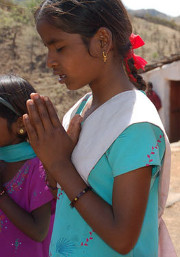 |
| Children's Bible Clubs are introduced in a community through a 10-day program. (Image courtesy of MNI) |
India (MNN) ― While believers were gathered at his home singing worship songs, a mob of Hindu extremists brutally attacked Raju,* a church leader trained by Grand Rapids, Michigan-based Mission India.
Dave Stravers with Mission India said about 20 men broke into Raju's home wielding clubs. Radicals destroyed things in the home and then turned their rage to Raju. When his 12-year-old daughter asked the extremists why they were attacking her father, they began to beat her, too.
"Persecution is a growing reality in India," said Stravers. After violently attacking Raju and his family, extremists proceeded to drag the believer and his wife to a nearby Hindu temple.
"They smeared vermillion--which is like a finger-paint--on their foreheads and pushed their heads down…and forced them to worship the idols in the temple," Stravers explained.
"This is a pretty typical thing; it happens quite often in India," he added.
Last month, the Evangelical Fellowship of India observed weekly attacks on Christians. Hindu extremists throughout India threatened and beat believers, often accusing them of "forcible conversions."
Could this escalating violence lead to another Orissa-like situation?
"That possibility is always there, yes," Stravers admitted. "It's impossible to predict when that might happen or where, but it's always a possibility.
"In the meantime, you have these local acts of aggression that happen every week, and many cases every day. This is happening all over India."
One of Mission India's partners believes that a non-Christian relative may have told the attackers about Raju's worship group. Raju and his family are currently in hiding. Stravers said a similar pattern takes place in India whenever believers face persecution: they lie low for a few weeks until the chaos dies down, and then resume their work quietly.
"After a few weeks, people realize that these Christians aren't a threat and that they're actually bringing good to the communities," explained Stravers. "Ideally, Raju will go back to his ministry, and the church will start worshipping again."
Ask God to protect this believer and his family.
"We need to pray that they will take courage, that they will receive comfort and support from other believers," stated Stravers. Pray also that the Gospel would continue moving forward in India.
"India is right on the frontier of what God is doing to make the Great Commission the Great Completion in our day."
Stravers said India is hungry for God's Word. For one dollar, you can send a child to Mission India's Children's Bible Club. Many families learn about the Gospel through their children who attend these clubs.
Labels:
dave stravers,
extremists,
Hindu,
India,
Karnataka,
mission india,
persecution,
radicals,
raju
Location:
India
Friday, September 28, 2012
Voice of the Martyrs gives pastor new dignity
 |
| (Image courtesy of VOM) |
India (MNN) ― In a northern region of India, Pastor Khanna spent 40 days in jail last November for baptizing seven Muslims. While the new believers insisted they weren't offered money to convert, this didn't stop local media from destroying Khanna's reputation in the community.
"You would hang your head in shame at what was written about [the pastor's] family," said a Voice of the Martyrs, USA partner.
The ordeal took a serious toll on Khanna's family and the church's view of his leadership. His wife became sick, as well as deeply disappointed by the church's lack of support. Meanwhile, church leaders hinted that Khanna shouldn't have baptized the converts from Islam.
Although his case was eventually dropped because of a lack of evidence, Khanna was dismissed from church leadership without pension.
But VOM has given the pastor new dignity. When lawyers in Kashmir refused to represent Khanna during his ordeal, VOM's partner in India helped him out. They recently came to the rescue again by offering the former pastor a job in Bangalore.
Pastor Khanna now speaks on behalf of persecuted Christians in churches throughout India. The move has improved both Khanna's confidence and his wife's health. Pray that her health continues to improve.
"I am not bothered by what happened to me, but I glorify the Lord," declared Pastor Khanna.
While Hinduism is India's majority religion, India has the world's third-largest Muslim community. Most people in Kashmir are Muslim. They surround churches during worship services and circulate hate literature with a racial undertone against Christians. Pig blood is highly offensive to Muslims, and the Kashmir media portrays believers as people who use it in their religious practices.
Pastor Khanna held many community-wide events in Kashmir, trying to reconcile Muslims and Christians. The controversial baptism that triggered Pastor Khanna's arrest was recorded at one of these events, and the video was later posted to YouTube.
VOM supports persecuted pastors in restricted nations throughout the world. Click here to learn more about their work.
You can sponsor Pastor Khanna and write him a letter by contacting VOM directly. Click here to fill out the form and type "Pastor Khanna" in the comments field.
Labels:
baptism of muslims,
India,
kashmir,
khanna,
Muslim,
persecuted pastor,
voice of the martyrs,
voice of the martyrs usa,
vom
Location:
India
Wednesday, September 5, 2012
Christians still suffering in Orissa state
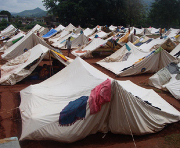 |
| Tens of thousands still homeless following 2008 violence. (Image courtesy of Voice of the Martyrs Canada) |
India (MNN) ― As if being terrorized by Hindu extremists and watching their homes burn to the ground wasn't enough, believers are still waiting for justice and compensation after four years.Voice of the Martyrs Canadasays 10,000 believers are still homeless after radicals destroyed over 5,000 homes and hundreds of church buildings throughout late 2008 and early 2009.
Pray for these suffering believers.
India's Orissa state (now called Odisha State) has always been a hotbed for anti-Christian violence. But it reached a new peak following the assassination of Swami Lakshmanananda Saraswati on August 23, 2008. Saraswati was the leader of India's radical Vishva Hindu Parishad (VHP). Although a Marxist group claimed responsibility for Saraswati's death, the VHP pinned the blame on Christians and launched vehement attacks.
As the attacks increased in severity and frequency, it became clear to the worldwide community that this situation was beyond violent protests: it was genocide.
Eventually, India's Supreme Court stepped in and ordered authorities to protect believers. Change in leadership at the national level and new protections for religious minorities seemed to bring hope to oppressed believers.
But it's hard to remain hopeful in your fourth year of desperate homelessness.
According to a fact-finding visit by a group of journalists, activists, and writers, there's been no justice for victims and even less compensation for lost homes and churches. And according to AsiaNews.it, India's government isn't planning to pay. Hundreds of churches and Christian facilities destroyed by Hindu radicals will remain in rubble.
What's bright side of this dark situation? You can help.
Pray for persecuted believers in Orissa state. Pray for boldness and strength as they face continuous adversity for their faith.
Give online to VOMC's Relief and Development Fund. Voice of Martyrs Canada helps Orissa Christians rebuild their lives through skills training, micro-loans, and discipleship training for church leaders. VOMC also cares for children orphaned by the violent attacks, providing a safe home, education, clothing, food and medical attention.
Labels:
genocide,
hindu extremists,
India,
Orissa,
vcm,
voice of the martyrs canada,
vomc
Location:
India
Monday, September 3, 2012
8 in 10 missing persons sucked into India's human trafficking problem
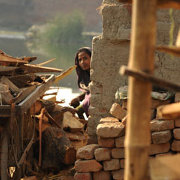 |
| (Image courtesy Bright Hope International) |
The statistics defy belief. Three years ago, human rights watchers said more than 1.2 million children in India were sold into prostitution, and as many as 100 million people in India are involved in trafficking-related activities. That number has only gone up.
The most likely victims of human trafficking are those living on less than a $1 a day. C.H. Dyer with Bright Hope International notes that, "People that are in extreme poverty will go to great measure to find security, food, just the basics of life."
Desperation drove local churches to Bright Hope to ask for help. "'We know there's a lot of prostitution and a lot of young girls that are forcibly put into prostitution in our community. What can we do to make a difference?'"
Bright Hope developed a network of churches in India to raise awareness and build strategic partnerships to be a part of the solution. The three-pronged approach included awareness, rescue, and rehabilitation.
An anti-trafficking program developed that included training for those who were involved in the rescues and rehabilitation programs for the rescued. The program hasn't been without its challenges. Building trust takes time. "Getting them out of the situation, working with the local authorities, working with the police to gain their confidence and the ability to go into these brothels and pull out the minors and offer the older women the chance to come out: this is all new in this rescue area."
It's a responsibility they don't take lightly with so much at stake, says Dyer. "You take your time, you pray, and you get the advice of those who have gone before you."
A proven track record...what does that mean for a rescue program? Dyer explains, "You'll see the people start to say, 'This works for people. Education, the Scriptures, a strong local church, job training."
In fact, the success rate has been encouraging. "The agencies we're working with have documented lower rates of prostitution in those communities where they have done this with good planning, and that's what we're bringing to this: proven solutions and a proven God who changes lives."
However, a successful rescue means there's an angry pimp or gang lord. "Certain pastors and leaders that are involved with our team have gotten death threats already and threats of violence against them."
Taking on human trafficking means a church is entering the spiritual fray. Dyer says often, there are drugs or idolatry involved. "It is dangerous. It is the front lines against evil. We need to partner with them in prayer specifically, that the power of the Lord would come upon them and protect them and lead them as they do these good works in His name."
Then, there's the question of whether slave rescues actually perpetuate the cycle of slavery. In cases where people were rescued from slavery in Ghana, it was found that many of them found their way back in later, or new slaves were taken. Dyer says that was the first question they asked themselves before embarking on this path: "Are you going to stir the pot and make things worse, or are you really going to get to some of the solutions that can change lives?"
Rehabilitation is focused on healing through professional Biblical counseling to regain strength, hope, and faith in God and His ability to restore them. Opportunities to earn a liveable wage must be given. Through job skills training, girls can have well-paying jobs as they rebuild their lives. Dyer goes on to explain that "These kinds of programs really can help people rise above their economic and spiritual situation. So we can create a pathway where some more will follow."
That being said, the team is gearing up for another major foray. "In just a few weeks, we're going to see this all ramp up to take even more girls out. My real desire today is that everybody who hears our voices would pray for the churches involved in human trafficking around the world."
Labels:
bright hope international,
churches,
discipleship,
gospel,
human trafficking,
India,
india partners,
red light,
safe houses,
sex slave,
training
Location:
India
Thursday, August 23, 2012
Pakistan considers anti-conversion laws; India's Christians concerned
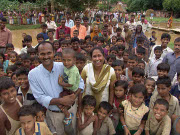 |
| (Photo courtesy of Mission India) |
India (MNN) ― Shunned and hated in Pakistan, families who suffered through torture, kidnapping and increasing pressure to convert to Islam finally fled across the border to India.
The only difference is that instead of Christian families, those on the run were Hindu. That prompted a huge cry from the Indian government on their behalf.
Officially, the government's stance is that Pakistani Hindus arriving in India are on pilgrimage. However, this week, Pakistan President Asif Ali Zardari waded into the fray. After being briefed on the growing problem of mass migration, he told the Sindh government to amend the Constitution and write an "anti-conversion" law.
That is raising some alarms. Pakistan already has a "blasphemy" law which is frequently used to settle personal scores with Christians. Even though a new anti-conversion bill is supposed to protect minority religions, that's not how it's often enforced.
On top of that, Dave Stravers with Grand Rapids, Michigan-basedMission India says if Pakistan comes up with its own "anti-conversion" law, it sets a precedent that neighboring states in India are likely to follow. Additionally, some Hindu leaders have grown more aware of the fast growth of Christians, especially in light of the Dalit Awakening in 2001.
"They're worried that their culture is being eroded and their political influence, their power, is being eroded. So they want to stop it."
Though India's constitution provides full religious freedom of worship and witness for all religions, there remains opposition. The rise of Hindutva extremism -- "India is Hindu only" -- resulted in hate campaigns against Christians and Muslims.
"Any law proposed in any India state will affect Christians first," Stravers notes. Harsh anti-conversion regulations in at least five states have done little to placate Hindu extremists. In many districts, the laws are often loosely worded and widely open to interpretation.
In smaller villages, Christians are given a choice: reconvert to Hinduism, leave the village, or face death. The risk of violent mobs and riots exploding into days of rampage is high. Simmering tensions are threatening to explode with the smallest twitch. Stravers agrees, "Inter-religious conflict and inter-ethnic conflict in this (border) region is often violent.... It causes a lot of fear."
Yet, oppression has done little to stem the flow of the Gospel. Stravers marvels, "Christian workers have such a great deal of courage in the face of opposition." Pray that despite the intimidation and violence in many of India's states, Christians will unashamedly preach the Gospel.
Labels:
anti conversion,
evangelism,
gospel,
India,
mission india,
Pakistan
Location:
India
Wednesday, August 8, 2012
75 dead from ethnic riots
India (MNN) ― Ethnic rioting between the Bodo tribespeople and Muslims in the Indian state of Assam has left 75 dead and 500 villages in ashes.
The attacks started a month ago on July 6 after a Muslim man in Assam was shot and killed.
Since then, a leader from each group has been killed. Four Bodo people were found brutally murdered by machetes.
The feud between the immigrant Muslims and the Bodo tribespeople runs deep over land disputes in Northeastern India. But such violence from the feud is now at a new level.
Gospel for Asia (GFA) calls the violence in Assam a “major national crisis.”
400,000 villagers in Assam have fled for their lives. 235 relief camps have been set up for displaced people.
Several GFA churches for Bodo Christians have been destroyed. On top of that, rioters have also devastated 15 believers’ homes.
GFA has around 60 congregations in a danger zone where violence is occurring. They also have 70 missionaries in the region.
Compassion Services through GFA are working to bring aid relief to displaced villagers and victims. As they bring the aid, GFA says they are seeking to give people the hope of Christ in this time of trial.
The ethnic rioting piggybacks on flooding that hit the Bodo region earlier. GFA missionaries are still helping many recover from both disasters. They ask for prayer.
Please pray for the safety of Christians and villagers in Assam. Pray for peace to come to the region.
Labels:
assam,
bodo tribe,
churches,
death toll,
ethnic riots,
ethnic violence,
Gospel for Asia,
India,
muslims,
relief camps,
villages
Location:
India
Monday, March 12, 2012
Burmese Christians Seek Refuge in India
By Jenny Yang
Special to ASSIST News Service
While these refugees have found some safety in India, the fear that the refugees live with in India is palpable. Without any form of proper protection in the form of documentation, many fear being deported back to Burma where they could be persecuted again. For many Chin refugees, they hope for the day when they can return to a safe, democratic, free Chin state in Burma. In the meantime, the Chin people in Mizoram yearn to be able to integrate into their host country of India.
** You may republish this story with proper attribution.
Special to ASSIST News Service
The mountainous terrain of India's Mizoram State, on Burma's border. |
BALTIMORE, MD (ANS) -- For years, I had heard that thousands of refugees from Chin State in Burma were fleeing into Mizoram State, India, to escape persecution at the hands of the Burmese military regime.
We heard these stories from the Chin people who were resettled to the United States through World Relief, pleading with us that their family and friends left behind in Mizoram desperately needed our assistance and protection. This population has been out of sight and out of mind of the international community because access to the Northeast area of India has been restricted for decades by the Indian central government. The Indian government lifted these restrictions in December 2011, which allowed me to participate in an assessment trip to see first-hand the challenges that these refugees face in this remote area of India.
 |
Palm Sunday procession in Mizoram. |
Mizoram State is a beautiful, rugged, mountainous area of India where houses hover on stilts over 40 feet ravines and children play alongside windy, unpaved roads. What’s striking to me about Mizoram is not only the physical beauty of the state but the vibrancy of the Mizo people’s Christian faith. Mizoram is the most Christian state in all of India where over 95 percent of the residents are Christians. In fact, the church is the strongest institution in the state, providing much needed social services through hospitals, orphanages and schools.
While the beauty and vibrancy of Mizoram shone, we also met with Chin refugees who are living in the shadows of this beautiful society. The horrific abuses they escaped in Burma are haunting and real. One woman, for example, was a teacher in Burma and one of her 14-year old students was raped by Burmese soldiers. When she reported this abuse to the authorities, they came to her house looking for her and she fled to India to seek safety.
She runs a small tea shop in Mizoram and tries to take care of her parents and brother who was tortured in Burma and escaped to India a few years before her arrival. We also met an 18 year old youth who was forced to porter for the Burmese military over 20 times in his young life, often for weeks at a time, carrying heavy military equipment and supplies with no pay, away from his family.
Chin refugee women sell vegetables in the marketplace to eke out a living. |
It is my hope that the international community will come alongside the church in Mizoram to welcome the Chins through protection and humanitarian assistance efforts, and that the U.S. government continues to raise with the Indian government the need to provide protection to this group of vulnerable refugees.
The full 134-page report with findings, recommendations, and photographs and a shorter executive summary can be found at www.chinseekingrefuge.com
 |
** You may republish this story with proper attribution.
Labels:
Burma,
burmese christians,
India,
seek refuge
Location:
Burma
Sunday, February 26, 2012
Men on Rescue Mission Beaten Up In a Red Light District In India
By Jacob Philip
Assistant Correspondent in India for ASSIST News Service
According to organization sources, two of their undercover operatives were trying to trace two minor girls trafficked into one of the brothels in the red light district of this city which is the second largest in the state of Maharashtra after Mumbai.
** You may republish this story with proper attribution.
Assistant Correspondent in India for ASSIST News Service
PUNE, INDIA (ANS) -- Undercover rescuers from the Indian Rescue Mission (IRM), who had gone to rescue minor girls forced into prostitution inside one of the brothels of Pune, India, were thrashed by a gang on Wednesday night, February, 22, 2012.
 |
A scene in the Pune red light district |
It happened that a group of people, mostly women and hooligans, gathered on the ground floor of a brothel building and as soon as IRM team members reached the ground floor, the mob pounced on them and beat them up.
One of the attacked member, Mr. Kamble, said, “One boy punched me in the face, giving me a bloody nose.”
According to Kamble, the attackers called the police and tried to mislead them by branding the activists as “extortionists.”
Kamble told ANS, “After the police noticed that we were the victims who were manhandled by the mob, they asked us to lodge a complaint against the attackers.”
 |
James Varghese with girls after a previous rescue conducted by his organization |
U K Yadav, the Sub-Inspector of the Faraskhana Police Station said, “The duo did not disclose their identity which led to the tension in the area. We have taken preventive action against Ghanashyam Dnyaneshwar Kulapalli (27) of Bhavani Peth who had allegedly beaten the staff member.”
Reacting to the episode, James Varghese, Founder of the Indian Rescue Mission, and also an ANS correspondent, said, “We are deeply disturbed by this incident and we feel that we who help the people of the society should be given protection. We condemn this act and we request the police to act swiftly and bring the attackers to book.”
For more details on IRM’s work visit them at:www.indianrescuemission.org
 |
Jacob Philip works as a correspondent for an Indian newspaper and also serves as the Assistant Correspondent in India for ASSIST News Service. Jacob lives in Bangalore and runs a software development business.
** You may republish this story with proper attribution.
Location:
India
Wednesday, February 1, 2012
International Petition Drive to Help Pastor Persecuted For Conducting Baptisms
By Michael Ireland
Senior International Correspondent, ASSIST News Service
** You may republish this story with proper attribution.
Senior International Correspondent, ASSIST News Service
SRINIGAR, INDIA (ANS) -- The president of the Global Council of Indian Christians is trying to raise international awareness of the case of an Indian pastor arrested on charges 'disturbing communal peace.'
In a media update, Ann Buwalda, Executive Director of Jubilee Campaign, says that Sajan George is highlighting the case through a petition drive.
Jubilee Campaign says Rev. Chander Mani Khanna, pastor of All Saints Church in Srinagar was on November 19th, 2011 arrested on charges 'disturbing communal peace.'
The arrests of Khanna and two others came after a local Muslim clerical association calling itself a 'Sharia court' accused Rev. Khanna of 'luring' Muslims into converting from Christianity. Their only evidence was a YouTube video of Rev. Khanna baptizing seven believers from a Muslim background.
Jubilee Campaign says that after 11 days in, jail Rev. Khanna was released on bail, but the so-called Sharia court issued a fatwa of expulsion, ordering him and two other Christian workers to leave the state.
In the media release, Buwalda says: “This case represents a worrying continuation of a dangerous trend Jubilee Campaign has seen in India for some time. Over the past several years radical Hindu leaders have reacted to the massive growth of Christianity with frequently accusations that Christians are 'luring' poor Hindus into converting by bribing them or lying to them. It was this sentiment which led to the passage of anti-conversion laws in several states of northern India and led to the 2008 violence against Christians in Orissa.”
Buwalda explained the causes of this sentiment are “complex and specific to the traditional Hindu society where political and economic power was based around the caste system.”
Buwalda said: “The Muslim view on conversions is more explicitly theological, as indicated by the term apostasy. Nevertheless the Hindu response to conversions, which involves baseless accusations of misconduct resulting in vigilante killings of religious minorities is very similar to the Muslim response that we have seen in Pakistan and elsewhere.”
Buwalda went on to state: “This attempt by the Kashmir Muslims to activate the radical Hindu lobbying in support of their actions has been at least partially successful judging by the response of a high-ranking Indian official.
“Of more immediate concern is to the local Christian community is the way that the Sharia court was able to enforce its fatwa of expulsion against Rev. Khanna and the two other Christian workers,” she said.
Buwalda added that, emboldened by their success, groups of local Muslims have been pressuring the families of converts, causing several other converts and Christians workers to flee.
In response, Sajan George, the president of the Global Council of Indian Christians, is trying to raise international awareness through the petition.
Jubilee Campaign urges concerned believers to sign the petition calling for the government of India to respect its own laws and stop the unjust persecution of Rev. Khanna.
Support Rev. Khanna and the Christian Minority in Kashmir, by signing the Petition here:http://tinyurl.com/774gh3m
| ** Michael Ireland is the Senior International Correspondent for ANS. He is an international British freelance journalist who was formerly a reporter with a London (United Kingdom) newspaper and has been a frequent contributor to UCB UK, a British Christian radio station. While in the UK, Michael traveled to Canada and the United States, Albania,Yugoslavia, Holland, Germany,and Czechoslovakia. He has reported for ANS from Jamaica, Mexico, Nicaragua, Israel, Jordan, China,and Russia. Michael's volunteer involvement with ASSIST News Service is a sponsored ministry department -- 'Michael Ireland Media Missionary' (MIMM) -- of A.C.T. International of P.O.Box 1649, Brentwood, TN 37024-1649, at: Artists in Christian Testimony (A.C.T.) International where you can make a donation online under 'Donate' tab, then look for 'Michael Ireland Media Missionary' under 'Donation Category' to support his stated mission of 'Truth Through Christian Journalism.' Michael is a member in good standing of the National Writers Union, Society of Professional Journalists, Religion Newswriters Association, Evangelical Press Association and International Press Association. If you have a news or feature story idea for Michael, please contact him at: ANS Senior International Reporter |  |
** You may republish this story with proper attribution.
Labels:
baptisms,
Christian persecution in India,
church pastor,
India,
petition
Location:
India
Wednesday, January 11, 2012
Police involved in Andaman Island 'Human Safaris'
The Observer newspaper has revealed evidence of police involvement in ‘human safaris’ in India’s Andaman Islands.
The scandal, first exposed in 2010 by Survival, the NGO which campaigns for the rights of tribal people, involves tourists using an illegal road to enter the reserve of the Jarawa tribe. Tour companies and cab drivers ‘attract’ the Jarawa with biscuits and sweets.
The Observer has obtained a video showing a group of Jarawa women being ordered to dance for tourists by a policeman, who had reportedly accepted a £200 bribe to take them into the reserve.
One tourist has previously described a similar trip: ‘The journey through tribal reserve was like a safari ride as we were going amidst dense tropical rainforest and looking for wild animals, Jarawa tribals to be specific’.
In recent weeks the Islands’ administration has again ruled out closing the road, known as the Andaman Trunk Road revealed for the first time that it plans to open an alternative route by sea to bypass most of the Jarawa reserve.
Survival has called for tourists to boycott the road, which the Supreme Court ordered closed in 2002. Working with a local organisation, SEARCH, Survival has distributed leaflets to tourists arriving at the Islands’ airport warning of the dangers of using the road.
Survival’s Director Stephen Corry said today, "This story reeks of colonialism and the disgusting and degrading ‘human zoos’ of the past. Quite clearly, some people’s attitudes towards tribal peoples haven’t moved on a jot. The Jarawa are not circus ponies bound to dance at anyone’s bidding."
[Ekk/4]
Tuesday, January 3, 2012
2012 brings push for bill that could protect India's Christians
India (MNN) ― Christians in India celebrated Christmas under the threat of violence. While there were isolated incidents reported, nothing on the scale of the Orissa pogrom of 2008 emerged.
Despite relief, they've begun this year with a push toward passing the Prevention of Communal and Targeted Violence Bill 2011.
Government reports show more than 6,000 incidents of communal violence were reported in India in the past ten years. That's a pattern that's likely to continue. KP Yohannann with Gospel for Asia says, "Personally, I don't expect this to change because more and more, people are choosing to follow Christ."
He goes on to say that, "Our people are facing persecution. Even recently, people walking into Sunday morning service, disrupting it, and attacking the missionaries and the pastors, threatening Christian families to renounce their faith." But he adds, "It is not as widespread as it was."
Some areas are more volatile than others. "Orissa has been, for years, what you call a 'boiling pot.' Whether the government is BJP or Congress, it seems that the fundamentalists seem to have a tremendous amount of network established."
In Kandhamal district, anti-Christians called for a general strike that would "Stop Christmas." GFA workers were worried that riots would erupt. Many fled their villages and took refuge in surrounding areas.
It's the same area that was most severely persecuted in the attacks against Christians in 2008. Throughout Orissa, more than 120 men, women, and children were murdered, and hundreds of homes and churches were destroyed.
These concerns are why the All India Christian Council (AICC) is pushing for the Bill to be presented to Parliament soon. It was drafted by the National Advisory Council and is now with the Union government.
Religious minorities and many members of civil society support it as a way to curb communal violence and bring justice to the victims. The problem, Yohannan says, is that, "People use religion, especially of the illiterate, innocent people, as a means to capture political ground and power. Religious fanaticism always is used by the crafty politicians to get power."
But it's really bigger than politics, Yohannan points out. Because GFA workers are tirelessly sharing the hope of Christ, people are coming to faith in Him. That means the opposition isn't so much extremists. "It's a really strong spiritual warfare. I think the strongest weapon we can use against this thing is prayer and fasting. Then, as Hebrews says, 'Come alongside the suffering brethren, and love them, embrace them, help them.'"
Passage of the Prevention of Communal and Targeted Violence Bill would protect some of the more vulnerable populations. However, Yohannan says this is not merely a political issue. "These communities, Muslim communities, Hindu and all, I think more and more people will come to know Jesus Christ, no matter what."
Pray for the believers in Orissa, that they will not fear and will remain strong in the Lord during this time. Pray that they will be lights shining in the darkness and that the Lord will protect them.
Labels:
evangelism,
gospel,
Gospel for Asia,
India,
persecution,
pogrom,
prevention of communal and targeted
Location:
India
Carolers beaten; violence only growing
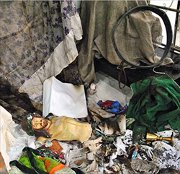 |
| Violence against Christians in India predicted to increase. (Photo courtesy of Compass Direct) |
India (MNN) ― Recent threats and outbreaks of violence against Christians in India show persecution is on the rise. Any hope for justice in this New Year looks grim.
In Orissa, an Indian state infamous for a wave of attacks against Christians back in 2008, threats of violence were made against Christians in an effort to "stop Christmas."
2,500 protestors rallied on December 18 under the leader of the Rashtriya Swayamsevak Sangh (RSS), an activist arm of the Hindu nationalist movement. The RSS leader called for a strike over Christmas weekend and into last week.
Dave Stravers with Grand Rapids, Michigan-based Mission India says the timing was intentional. “When there’s a general strike, the opportunities for violence are just multiple…it’s a time [that] these extremists use to get violent against people they don’t like, and Christians are usually the targets of that.”
Violence did breakout in Karnataka, a neighboring state just south-west of Orissa. A group of 15 Christians were meeting privately in a new believer’s house singing Christmas carols.
Outside the house, a mob of around 300 RSS members gathered and attacked the house, breaking windows, furniture, and brutalizing the Christians.
Stravers says the police came and arrested all the believers after they were beaten. The Christians were thrown in jail for a week while no action was taken against the attackers.
The leader of the house gathering, Pastor Manu Das, is still currently in intensive care with severe head injuries and internal bleeding.
“This illustrates the justice problem,” states Stravers. “Someone comes to beat you up, and then the police come and arrest you and accuse you of inciting that other person to violence!”
With such a breakdown in India’s justice system, things don’t look good for Christians this next year. But in the midst of persecution, believers in India have reported a rapid spread of the Good News.
According to Stravers, “Hostility in India has been increasing over the entire country… This is the direct result of the fast growth of the church and the great response to the Gospel in so many areas.”
Please pray for courage in Indian believers this next year and for justice to take hold in the hearts of leaders.
Location:
India
Wednesday, December 14, 2011
Indian state government failed to stop anti-Christian violence
An independent tribunal investigating anti-Christian violence in India's eastern Orissa state in 2008 has indicted the state government for failure to protect Christians and has made several recommendations -writes Anto Akkara.
"[Government] officials have played a variety of negative roles during the violence, ranging from being silent spectators and bystanders to the violence [to] refusing to protect or assist the victim-survivors even in the context of brutal killings," wrote the jury of the National People's Tribunal on Kandhamal.
The tribunal's final report was released on 2 December 2011 at Orissa's capital, Bhubaneswar, in the presence of more than 1,000 people, including social activists, Christian clergy and hundreds of victims of the violence in Kandhamal, about 300 kms from Bhubaneswar.
The jury also charged the Orissa police with "complicity" in the violence that engulfed the remote jungle region of Kandhamal in August 2008 following the killing of Hindu leader Swami Lakshmanananda Saraswati.
Though Maoist rebels claimed responsibility for Saraswati's murder, Hindu fundamentalist groups alleged that the murder was a Christian conspiracy. In the widespread violence that went on unabated for weeks, more than 100 Christians were killed, and 300 churches and 6,000 houses were looted and burned, rendering over 56,000 people homeless.
The 200-page document, titled 'Waiting for Justice,' also expressed "deep concern that the criminal justice system has been rendered ineffective in protecting victim survivors and witnesses, providing justice and ensuring accountability for the crimes perpetrated."
"The government officials and police are duty bound to protect the people when in danger. But in Kandhamal, they sided with the perpetrators," said Vrinda Grover, a lawyer in the federal supreme court and one of the dozen jury members.
"If the government had taken necessary precaution, most of the violence could have been prevented," pointed out retired high court judge Michael F. Saldana, a Catholic.
The jury made a series of recommendations including impartial retrial of closed cases, meaningful compensation for losses and rehabilitation programmes and urgent steps to uphold freedom of religion in Orissa.
Addressing the challenges that lay ahead, Ram Puniyani, a Hindu and convenor of the tribunal, told a seminar on the tribunal verdict that "the report is ready. But don't think our work is over. It only begins now."
"I do not know when I will get justice," Komal Digal, who lost property worth 1.5 million rupees (US$29,000), but received compensation of 20,000 rupees (US$390), told ENInews.
[With acknowledgements to ENInews. ENInews, formerly Ecumenical News International, is jointly sponsored by the World Council of Churches, the Lutheran World Federation, the World Communion of Reformed Churches and the Conference of European Churches.]
[Ekk/3]
Labels:
anti-christian persecution,
communal violence,
India,
Orissa
Location:
India
Tuesday, November 29, 2011
Christian school demanded by Muslims in India
 |
| Help build a Christian high school in India. $5 buys 40 bricks. |
India (MNN) ― Six years ago Global Action started a Christian school in a predominately-Muslim area of India. Today, God is opening doors to do even more.
President of Global ActionLars Dunberg says they started the elementary school near the border of Nepal. "When we came there, there was no functioning school. There was a government school where teachers would show up once every two weeks for a day, but no school program."
Last year, Global Action changed the program to an English medium school, which means "all classes fifth to seven grade are in English. And classes first through fifth start introducing English in all the classes. When we did that, all the Muslims in the neighborhood stood in line with their children to enroll them in this Christian school."
Last year, Muslims heard the Gospel because of the school's Christmas pageant. "The church was packed with Muslim parents who were in church for the first time, hearing the Gospel for the first time through the very mouths of their own children through a Christmas pageant."
A grade school education wasn't enough for the parents, however. Dunberg says the parents requested more. "We kind of pointed out that this was a Christian school, and they said, 'We don't mind. We want to have our children educated. We demand you Christians build a high school."
So three weeks ago, they broke ground for a new 400-student high school building. But Dunberg says they only had enough money raise for the foundation. "We're going to build it as we get funding. Every $5 provides 40 bricks. We need two million bricks. It actually takes less than $300,000 to build this two-story high school."
Dunberg is hoping the money is raised quickly. "The school year starts in July, so it's our dream to have at least one floor ready by then, if not both floors."
Many young people have given their hearts to Jesus already as they've learned about Christ. Dunberg says this school could have a profound impact. "There will be a growing ground for them to be confronted in a positive way with the claims of Christ, and be able to see Him shape their lives for the future. They have a chance to go on to University. They have a chance to be the future leaders of their country."
Labels:
asia,
christians,
high school,
India,
muslims
Location:
India
Jammu Pastor Accused of Paying Muslims to Convert
 |
| (AP Images/Mukhtar Khan) |
Charges that a pastor in Jammu and Kashmir state “lured” Muslims to Christianity by offering money are false and have put the lives of the clergyman and other Christians in danger, according to Bishop Pradeep Kumar Samantaroy of the Church of North India denomination.
Following the arrest on Nov. 17 of the Rev. Chander Mani Khanna, pastor of All Saints Church in Srinagar, Bishop Samantaroy told Compass by phone that the time has come for the church to speak up against the “discriminatory action” by authorities in India’s Kashmir Valley.
The bishop of the Amritsar Diocese said the pastor told him his life was in danger, as the charges have angered area Muslims. The government must provide protection to the pastor, churches and Christian institutions “immediately,” he said.
The allegations of allurement appear to have turned Muslim clergy and separatist leaders against the Christians. Kashmir lies at the heart of a bitter territorial dispute between India, Pakistan and China, even as many Kashmiris call for separation from India. Two prominent leaders of the separatist movement, Syed Ali Shah Geelani and Mirwaiz Umar Farooq, have met religious leaders to prevent “conversions.”
A court in Srinagar on Nov. 18 remanded Pastor Khanna to judicial custody for 15 days, a representative of the Evangelical Fellowship of India’s advocacy wing told Compass. Pastor Khanna was arrested for creating “enmity” between religious communities and hurting religious sentiments.
Bishop Samantaroy said the allegation made by Kashmir Grand Mufti Bashir-ud-din Ahmad, the state’s highest official of Islamic law, that Pastor Khanna had converted Muslims by offering money was “totally baseless and untrue.”
Ahmad has a video of Muslims being baptized in Pastor Khanna’s church, which he said was evidence on which to file a police complaint of fraudulent conversion, although the video only shows a baptism ceremony. The Constitution of India grants religious freedom to all, allowing them to propagate and change their religion or have no religion at all.
Superintendent of Police of East Srinagar Sheikh Zulfkar Azad, however, told Compass there was “certain evidence” of allurement by Pastor Khanna, though he did not specify it.
“I am in hospital for treatment, and that’s all I can say at the moment,” he said.
Seven youths who were baptized, as shown in the video, have denied to police that they were offered money to convert, a local Christian told Compass. But some local newspapers have quoted anonymous police sources as claiming the converts were given money.
A source who requested anonymity previously told Compass that police beat the converts from Islam when asking them if Christians had given them money for their conversion.
Police arrested Pastor Khanna two days after the mufti held a hearing on conversions in the Shariah(Islamic law) court he heads. Although shariah courts in India deal only in civil matters with community people’s cooperation and do not have any legal authority, the mufti had summoned the pastor to appear for the hearing. The pastor agreed in an effort to maintain peace.
On the pretext of meeting with a senior police official, police picked up Pastor Khanna at his residence on Nov. 17. After arresting him, officers did not inform his family, nor was the pastor given any written communication concerning the charges, the bishop said.
Police later brought Pastor Khanna to his home as they searched for evidence. They took CDs and literature for examination and kept him in custody.
Bishop Samantaroy said Kashmir’s Bar Association had asked its members not to defend the pastor. The church has asked a lawyer from Jammu, a Hindu-majority region in the state, to apply for his bail.
He also said he was worried about Pastor Khanna’s health. The pastor is diabetic and needs daily medical attention, and the bishop said he has learned that the doctor looking after him has a poor attitude toward him.
The pastor earlier told Compass that the Muslim youths had been coming to the church on their own initiative and wanted to take part in Holy Communion. Pastor Khanna told them they had to follow a procedure if they wanted to join in the sacrament, and they expressed desire to be baptized in due course.
Barring a few sporadic incidents of communal violence, Christians and Muslims had had good relations in Kashmir. Tensions began in March 2003 after local newspapers alleged that Christian missionaries were converting Muslim youth. Reports of conversions followed an article in an evangelical Christian website in the United States that claimed thousands of Muslim youths were converting to Christianity, which local Christians say was not true.
In November 2006, a convert from Islam, Bashir Ahmed Tantray, was shot dead by Islamist extremists in Barmullah district. Tantray’s name had appeared in newspaper reports.
In September 2010, Muslim mobs burned a school and a church in Tangmarg district after a television channel showed a U.S. pastor burning the Quran.
Labels:
christians,
India,
muslims
Location:
Jammu & Kashmir
Subscribe to:
Posts (Atom)
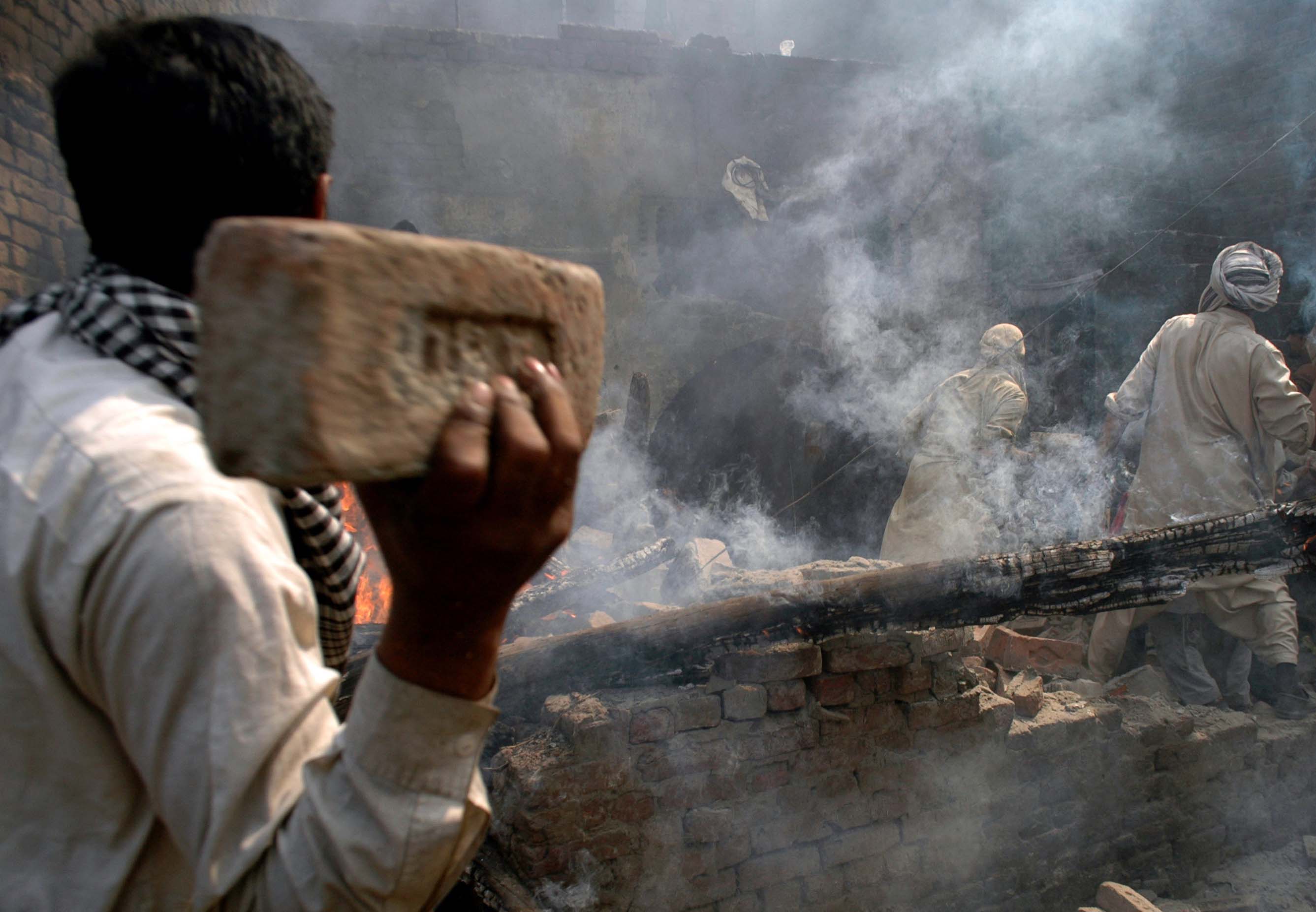
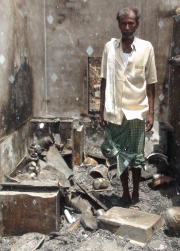


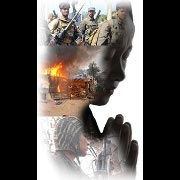
_0125_-_Kadhamal_(600_x_450).jpg)